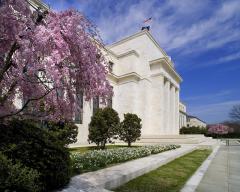As I noted in my reaction to reports of Jerome Powell’s nomination, Trump’s endorsement was a significant defeat for the growing movement among Hill Republicans to force the Fed to adopt “rules-based monetary policy.” Since I’ve already written on why I think such reform plans would largely fail to achieve their desired ends, I’m not particularly bothered by the defeat — but I do think there is a lesson to be gained here on libertarian strategy.
As Jeff Deist noted at the Mises Institute’s 35th Anniversary, along with some genuine disagreements regarding economics and political theory, Murray Rothbard and F.A. Hayek held very different opinions on the best strategy going forward to promote liberty. While both agreed, following Mises’s insights, that winning “hearts and minds” was absolutely essential to a free society — government would not be limited by pursuing and tricking the populist into something it wasn’t prepare to adopt — they disagreed on the best way of accomplishing this task.

While Rothbard favored a libertarian-populist strategy aimed at educating and energizing laypeople, Hayek thought it was best to influence academics and intellectuals, what he termed “second hand dealers of ideas.” A more classically liberal intelligentsia would influence policymakers and from that good — or at least better — public policy would follow.
While it may be a step too far to suggest that this approach can never lead to any form of substantial policy victory in Washington — and certainly no intellectual movement should be limited to a single strategy — Trump’s nomination of Powell I think does highlight one of the major flaws with Hayek’s strategy.
After all, in theory all the pieces were being moved in place. The financial crisis of 2008 forced the economic profession to seriously re-evaluate the orthodoxy of monetary policy. While the reaction of then-Chairman Ben Bernanke and his predecessors has been to enhance the power of America’s central bank and push the country — and by extension the world — into truly unprecedented territory, academics around the world re-evaluated monetary policy at a more fundamental level.













Leave A Comment